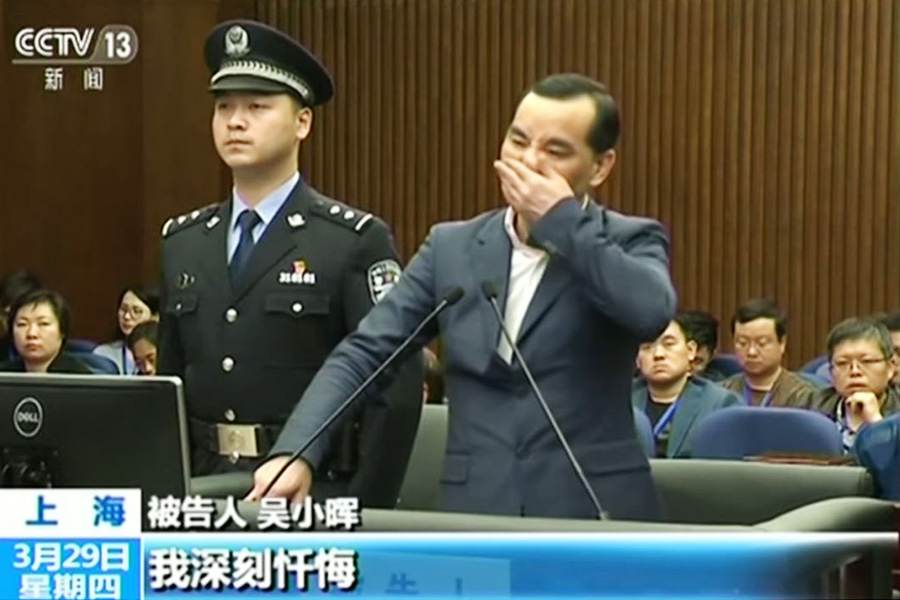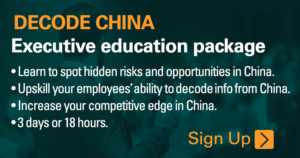◎ Wu Xiaohui was a “white glove” for many Party elites.
Chen Youxi, a Chinese lawyer known for defending controversial persons, wrote on his Weibo account in the morning of May 30 that Anbang Group co-founder Wu Xiaohui was appealing his conviction on charges of fraud and embezzlement. The Shanghai High People’s Court has since formed a collegial court to review Wu’s appeal.
The backdrop: Anbang and Wu Xiaohui
Feb. 23: The China Insurance Regulatory Commission announced a government takeover of Anbang. Anbang chairman Wu Xiaohui was officially prosecuted for economic crimes.
March 28: The Shanghai No. 1 Intermediate People’s Court charges Wu with fraud (65.2 billion yuan) and embezzlement (10 billion yuan). During the hearing, he first disputed the charges, then pleaded guilty hours later. Wu cried bitterly in court while requesting leniency.
May 10: The Shanghai court sentenced Wu Xiaohui to 18 years in prison, deprived him of political rights for four years, and confiscated 10.5 billion yuan of his assets.
Meanwhile, Sino-Ocean Group Holding announced that it would acquire 50 percent of Anbang’s equity interest in Beijing Bangbang Commercial Property Company, a wholly-owned Anbang subsidiary, at no cost. At the time, Anbang was the second largest shareholder of Sino-Ocean Group with a 29.7 percent stake.
The backdrop: Sino-U.S. trade talks
May 10: Wu Xiaohui is sentenced, and is given 10 days to appeal. His appeal period coincided with the second round of Sino-U.S. trade discussions in Washington. The delegation was led by Chinese vice premier Liu He, a close confidant of Xi Jinping.
May 18: The official Weibo account of the Communist Youth League shared a photo of the signing of the Boxer Protocol of 1901, one of the unequal treaties between China and Western powers in the early 20th century.
On the same day, the Global Times published an article warning the Chinese trade delegation against bringing an “unequal treaty” back to China, and that the Chinese society would not tolerate such an “achievement.”
In other words, both the Global Times and the Communist Youth League, which are long associated with the Jiang Zemin faction that rivals the Xi Jinping camp, were insinuating that Liu He was selling out China.
May 19: Chinese state media reported that the Sino-U.S. trade talks in Washington was a “win-win” victory for both sides and that there was “consensus” on six items. State media also said that both countries were suspending the implementation of tariffs.
May 29: The White House released a statement that proposes to impose 25 percent tariffs on $50 billion worth of Chinese imports, as well as take action against China’s intellectual property abuses.
Meanwhile, Secretary of State Mike Pompeo announces that the first-ever Ministerial on Advancing Religious Freedom would be held at the Department of State from July 25 to July 26.
Our take:
1. Wu Xiaohui, the former grandson-in-law of Deng Xiaoping, was a “white glove” (money launderer) for many Chinese Communist Party (CCP) elites. He was especially close to the clans of Jiang Zemin and Zeng Qinghong.
Although Xi Jinping frequently warned the Chinese officialdom and business elites that he would arrest those who continue to partake in corruption after the 18th Party Congress, Wu continued to make high-profile overseas merger and acquisitions. Wu, who likely presumed that his background was “red” enough to avoid arrest, ultimately met his downfall in 2017 when he was put under investigation.
2. Wu’s appeal suggests that he and his political supporters continue to oppose Xi Jinping. Wu and co. are likely seizing on the issue of China making concessions at the Sino-U.S. trade talks to mount a counterattack against the Xi administration.
We previously analyzed that China cannot withstand a full-blown trade war with the U.S. as the resulting economic and political issues that arise would imperil the CCP. Thus, Xi administration has to make concessions and delay the trade war to buy as much time as possible to fix China’s economic woes or outlast President Donald Trump’s stay in office.
Meanwhile, opponents of Xi would seek to find fault with him and his administration by seizing on even the smallest of “missteps,” regardless of whether it is retaliatory action against the U.S. or the giving up of concessions. So Xi’s rivals would view the recent White House statement about the imposing of tariffs as a huge slap in the face for Liu He, who declared that China and America had agreed to suspend tariffs and that Sino-U.S. trade relations were heading in a “win-win” direction. (See here and here)
3. CCP propaganda has been struggling mightily to cope with Trump and his administration’s unpredictability on the issues of Sino-U.S. trade, sanctioning ZTE, human rights, North Korean denuclearization, and other bilateral matters—an unprecedented phenomenon.
What’s next:
1. There should be a fresh round of fierce struggles inside the CCP. Xi Jinping’s political rivals would continue to find ways to create trouble for him and his allies, undermine his authority, and drive a wedge between China and America. To counter his opponents, Xi would find ways to strengthen his control over the officialdom, the military, and society.
2. China should take additional steps to open up its economy and make further concessions to the U.S. While the Xi administration faces substantial risks with increased economic liberalization, opening up is still a far less risky and more controllable venture than a full-blown trade confrontation with America.













